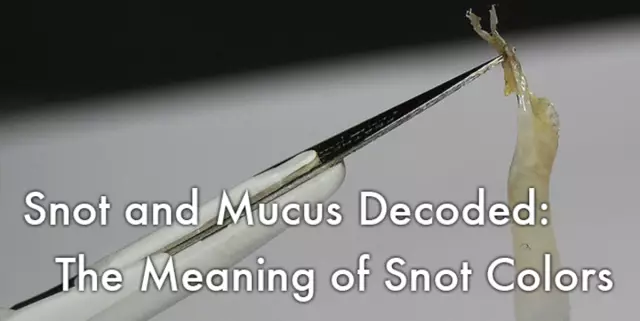- Author Curtis Blomfield blomfield@medicinehelpful.com.
- Public 2023-12-16 20:44.
- Last modified 2025-01-23 17:01.
Almost any mom is waiting with trepidation for a new stage in the development of her baby - teething. Despite the restless state of both children and parents, the latter, as a rule, are very happy with such an event. Usually this process is accompanied by fever, pain in the gums, sleep disturbance. Teething snot is also no exception.
Time of appearance of first teeth
The first teeth in babies appear at about 4-7 months. However, it is impossible to set certain limits with certainty. According to experts, each child develops individually, this also applies to teething. There are many factors that affect the timing of the appearance of teeth. These include the region of residence, and food, and the quality of drinking water, and climate, and so on.

Early teething symptoms
As a rule, the onset of teething is accompanied by profuse salivation and reddening of the gums. These symptoms are early, appearing about 2 months before the first tooth comes out. When the hour comesx , the child begins to act up and becomes hot. Painful sensations on the gums lead to the fact that the baby loses his appetite and sleep for some time, often puts everything that falls into his hands into his mouth. Soon, parents notice white stripes on the child's gums, which will later become teeth.

If the child will not let you watch the growth of teeth - and this is likely to be the case - then you can get into your mouth with a spoon. When you move it along the gums, you will hear a kind of knock, which will mean that the tooth has already erupted.
Most Common Symptoms
Now let's take a closer look at the symptoms that occur during teething. Your baby may have a fever and a runny nose. Snot during teething can be the result of a decrease in immunity. The temperature may last one or two days. If the fever persists, see a doctor.
During this period, the baby's snot is a frequent occurrence. Runny nose should not be severe and last more than three days. It is not necessary to treat it, you just need to clean the child's nose more often. If your child has snot that has a thick greenish consistency, consult a doctor. This may be the result of some viral disease. Teeth erupt, and snot flows in the child - immediately note when this symptom appeared. Long-term runny nose should alert young parents.
It's not uncommon for little people to cough or have diarrhea when teething. And again, their durationshould alert mom.

Causes of snot during teething
Many parents wonder: "Why do snot appear when teething?" And it's easy to explain. There are two reasons. Firstly, it may be the result of a viral infection, a consequence of a decrease in immunity. Secondly, there is a purely physiological explanation. The blood supply to the gums and the nasal mucosa are anatomically interconnected. Blood circulation in the nasal cavity is activated. Hence the activation of the glands of the mucous membrane and, as a result, transparent discharge.
Experts say that snot during teething in children, with the exception of elevated body temperature, is a normal phenomenon that does not require treatment.






